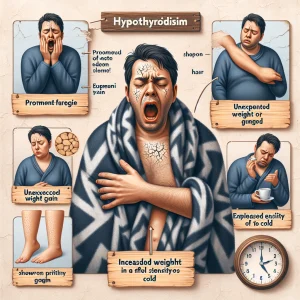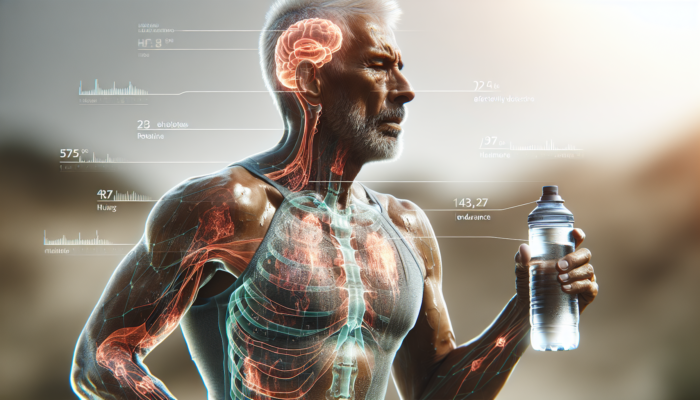Identify and Manage the Key Signs and Symptoms of Hypothyroidism
Hypothyroidism is a multifaceted medical disorder that occurs when the thyroid gland fails to produce sufficient levels of essential thyroid hormones. This butterfly-shaped gland, situated at the front of your neck, is crucial for regulating vital bodily functions, including metabolism, energy levels, and overall health. An underactive thyroid can trigger a series of physiological changes that affect nearly every system within the body. The primary hormones involved—thyroxine (T4) and triiodothyronine (T3)—are vital for maintaining a healthy metabolic rate. A decrease in their production can lead to significant drops in energy, weight fluctuations, and a general decline in well-being, highlighting the urgency of recognizing and understanding the extensive effects of this condition.
A variety of factors can contribute to the development of hypothyroidism, including autoimmune disorders like Hashimoto’s thyroiditis, specific medications, previous radiation treatments, or inadequate iodine intake. It is essential to be aware of the risk factors and symptoms associated with hypothyroidism, as they can greatly affect your health and quality of life. Often dubbed the body’s “metabolic engine,” a reduction in thyroid function leads to metabolic disturbances that may manifest as weight gain, persistent fatigue, and a plethora of other debilitating symptoms. It is important to note that hypothyroidism is diagnosed more frequently in women and tends to become more prevalent with age. Identifying these signs and symptoms is critical in empowering you to seek timely medical intervention and explore appropriate treatment options.
Essential Insights and Information About Hypothyroidism
- Hypothyroidism is characterized by insufficient hormone production from the thyroid gland, resulting in various physical and psychological symptoms.
- Common indicators of hypothyroidism include fatigue, weight gain, dry skin, and increased sensitivity to cold temperatures, among other symptoms.
- Physical manifestations may also feature hair loss, joint pain, and muscle weakness, significantly impacting daily activities and overall lifestyle.
- Emotional and psychological consequences can include depression, anxiety, and difficulties concentrating, potentially worsening mental health challenges.
- Identifying hypothyroidism in children and adolescents can be particularly difficult, as symptoms may manifest as growth delays, delayed puberty, or issues with academic performance.
- Diagnosis typically involves blood tests measuring thyroid hormone levels and thyroid-stimulating hormone (TSH) levels.
- The standard treatment for hypothyroidism generally consists of synthetic thyroid hormone medications that address insufficient hormone production.
- Incorporating lifestyle modifications such as a balanced diet, regular exercise, effective stress management, and prioritizing quality sleep can greatly improve hypothyroidism management.
 Recognizing Common Symptoms of Hypothyroidism in Daily Life
Recognizing Common Symptoms of Hypothyroidism in Daily Life
Throughout your daily routine, you may encounter various symptoms that could suggest an underactive thyroid. A prevalent complaint among individuals with hypothyroidism is a continuous sense of fatigue. Many individuals report feeling exceptionally tired even after a full night’s rest, which can significantly hinder motivation and daily functioning. This overwhelming tiredness not only affects physical health but also compromises emotional stability and overall productivity, often leading to frustration and increased health risks.
In addition to fatigue, unexpected weight gain is a frequently observed symptom. Individuals may notice weight increases despite maintaining a healthy diet and exercise routine. This frustrating situation typically results from a slowed metabolism associated with reduced thyroid hormone levels. Other symptoms may include heightened sensitivity to cold, dry skin, hair loss, and constipation. Recognizing these early warning signs is crucial, as it facilitates timely medical intervention and effective management of the condition.
Understanding the Physical Symptoms Linked to Hypothyroidism
The physical symptoms associated with hypothyroidism can vary widely and significantly impact your daily life. One of the most noticeable signs is a distinct change in the condition of your skin and hair. Many individuals report experiencing dry, rough, and flaky skin that can be both uncomfortable and distressing. Hair may also become brittle and prone to falling out more easily, raising concerns about appearance and self-esteem, which can further affect mental health.
Another physical symptom to be aware of is myxedema, characterized by swelling, particularly in the face or around the eyes. This condition arises from the accumulation of mucopolysaccharides in the skin, resulting in a puffy appearance that can be quite alarming. In addition, muscle weakness and joint pain are common complaints for those diagnosed with hypothyroidism. The discomfort and stiffness experienced in muscles and joints can limit participation in previously enjoyable activities. Therefore, recognizing these physical symptoms is vital for understanding the broader implications of hypothyroidism on your body and overall quality of life.
Investigating the Emotional and Mental Health Impacts of Hypothyroidism
Hypothyroidism affects not only physical health but also profoundly influences emotional and mental well-being. Many individuals coping with this condition often report feelings of depression or heightened anxiety that appear disproportionate to their everyday circumstances. You may find yourself experiencing persistent sadness or a lack of motivation without any apparent cause. If these emotions continue, they can become particularly concerning and serve as indicators of the more profound effects of the condition on mental health.
Cognitive functions can also be impacted, with many individuals describing symptoms that resemble “brain fog.” This cognitive decline manifests as difficulties with concentration, forgetfulness, and a general sense of mental sluggishness. Such cognitive challenges can disrupt daily responsibilities, making it increasingly difficult to manage tasks both professionally and personally. Being aware of these emotional and cognitive symptoms related to hypothyroidism is crucial for seeking the appropriate support and treatment necessary to enhance your overall quality of life.
 Recognizing Hypothyroidism Symptoms in Children and Adolescents
Recognizing Hypothyroidism Symptoms in Children and Adolescents
Hypothyroidism is not restricted to adults; it can significantly affect children and adolescents, often manifesting differently than in adult populations. In younger individuals, symptoms may not always be immediately apparent. For example, you might notice signs such as growth delays or difficulties concentrating in academic settings. These symptoms can easily be misconstrued as typical childhood behaviors or common developmental delays, making it essential for parents and guardians to remain vigilant and proactive in monitoring their children’s health.
In addition to growth-related issues, children diagnosed with hypothyroidism may also experience profound fatigue or lethargy, which can greatly diminish their participation in physical activities and social interactions with peers. Mood swings and irritability are also frequently observed, as hormonal imbalances disrupt emotional regulation. If you suspect that your child is displaying symptoms indicative of hypothyroidism, it is crucial to consult a healthcare professional for a thorough evaluation and testing to ensure their health and developmental progress are closely monitored.
Grasping the Significance of Thyroid Function Tests in Diagnosing Hypothyroidism
The Vital Role of Thyroid Function Tests in Accurate Diagnosis
The journey to diagnosing hypothyroidism typically begins with thyroid function tests, which are critical for assessing the health of your thyroid gland. The most commonly performed tests measure levels of Thyroid-Stimulating Hormone (TSH) and free thyroxine (T4). The pituitary gland produces TSH, which is essential for signaling the thyroid to generate T4. Elevated TSH levels can indicate that the thyroid is underactive and insufficiently producing hormones, suggesting the possibility of hypothyroidism.
Deciphering Thyroid Test Results for Accurate Diagnosis
At the same time, evaluating T4 levels is crucial for determining the extent of hormonal deficiency. When blood tests reveal elevated TSH levels alongside low T4 levels, this combination typically confirms a diagnosis of hypothyroidism. Understanding the details of these tests can help alleviate concerns and clarify your thyroid health, empowering you to take informed steps toward effective treatment.
Empower Yourself with Knowledge About the Diagnostic Process
Enhancing your comprehension of the diagnostic process not only enriches your knowledge but also empowers you as you navigate your health journey. Being knowledgeable about how thyroid function tests work and what they indicate about your body encourages more productive discussions with your healthcare provider, enabling proactive management of your health and overall well-being.
 Comprehensive Approaches for Effectively Managing Hypothyroidism
Comprehensive Approaches for Effectively Managing Hypothyroidism
Upon receiving a diagnosis of hypothyroidism, numerous treatment options are available to help you manage the condition effectively. The most commonly utilized strategy is hormone replacement therapy, typically involving synthetic levothyroxine. This medication is designed to mimic the natural function of thyroid hormones, aiding in the restoration of normal hormone levels, alleviating symptoms, and improving overall well-being.
Your healthcare provider will collaborate closely with you to determine the appropriate dosage tailored to your specific needs and how your body responds to the treatment. Regular blood tests are crucial to ensure that your hormone levels remain within the desired range. Maintaining open lines of communication with your healthcare team regarding any changes in your symptoms or potential side effects is vital for optimizing your treatment experience and achieving the best possible health outcomes.
Adopting Lifestyle Changes for Enhanced Management of Hypothyroidism
Alongside medication, implementing specific lifestyle changes can significantly boost your ability to manage hypothyroidism effectively. A balanced diet that emphasizes whole foods can be beneficial for supporting thyroid function and overall well-being. Incorporating foods rich in iodine, selenium, and zinc—such as fish, nuts, seeds, and leafy greens—can provide essential nutrients that are crucial for optimal thyroid functionality and hormone production.
Furthermore, engaging in regular physical activity is vital for maintaining a healthy weight and increasing energy levels. Moderate exercise can help combat fatigue, elevate mood, and enhance cognitive function, contributing to a greater sense of well-being. Prioritizing good sleep hygiene is equally important; aiming for 7-9 hours of quality sleep each night supports hormonal balance and overall health.
By gaining a deeper understanding of hypothyroidism and its impacts on both physical and emotional health, you empower yourself to take charge of your well-being. With the right approaches to diagnosis, consistent management, treatment options, and lifestyle adjustments, you can navigate this condition with confidence. Remember, you are not alone on this journey; seeking support from healthcare professionals and loved ones can significantly enhance your journey towards achieving optimal health.
Frequently Asked Questions About Hypothyroidism
What are the most prevalent symptoms associated with hypothyroidism?
Common symptoms linked to hypothyroidism include fatigue, weight gain, constipation, dry skin, hair loss, sensitivity to cold, muscle weakness, and depression.
Can hypothyroidism cause changes in the menstrual cycle?
Yes, hypothyroidism can lead to alterations in the menstrual cycle, which may present as irregular periods, heavy bleeding, or even missed periods altogether.
Is hair loss a common symptom of hypothyroidism?
Hair loss is a frequent symptom of hypothyroidism, often manifesting as thinning hair, brittle strands, or noticeable bald patches.
Can hypothyroidism contribute to weight gain?
Yes, hypothyroidism can lead to weight gain due to a decreased metabolic rate and potential fluid retention within the body.
What mental health symptoms are associated with hypothyroidism?
Mental health symptoms related to hypothyroidism may include depression, anxiety, irritability, and difficulties with concentration.
Can hypothyroidism lead to muscle weakness?
Yes, individuals affected by hypothyroidism often experience muscle weakness and discomfort, which can hinder daily activities and exercise routines.
Is cold sensitivity a common symptom of hypothyroidism?
Yes, sensitivity to cold is a typical symptom of hypothyroidism, often associated with a lower basal metabolic rate and diminished heat production in the body.
Can hypothyroidism cause dry skin?
Yes, hypothyroidism can result in dry and itchy skin due to decreased oil production and sweating, leading to discomfort and irritation.
Presented BY: Hypothyroid Blood Tests
Hypothyroidism Symptoms: Key Signs to Recognise Was First Published By https://bloodtest.co.uk
Find Us On Facebook: EZ Blood Tests
The Article: Hypothyroidism Symptoms: Essential Signs to Identify appeared first on: https://ezbloodtest.com
The Article Hypothyroidism Symptoms: Key Signs You Should Recognize Was Found On https://limitsofstrategy.com
References:
Hypothyroidism Symptoms: Key Signs You Should Recognize



